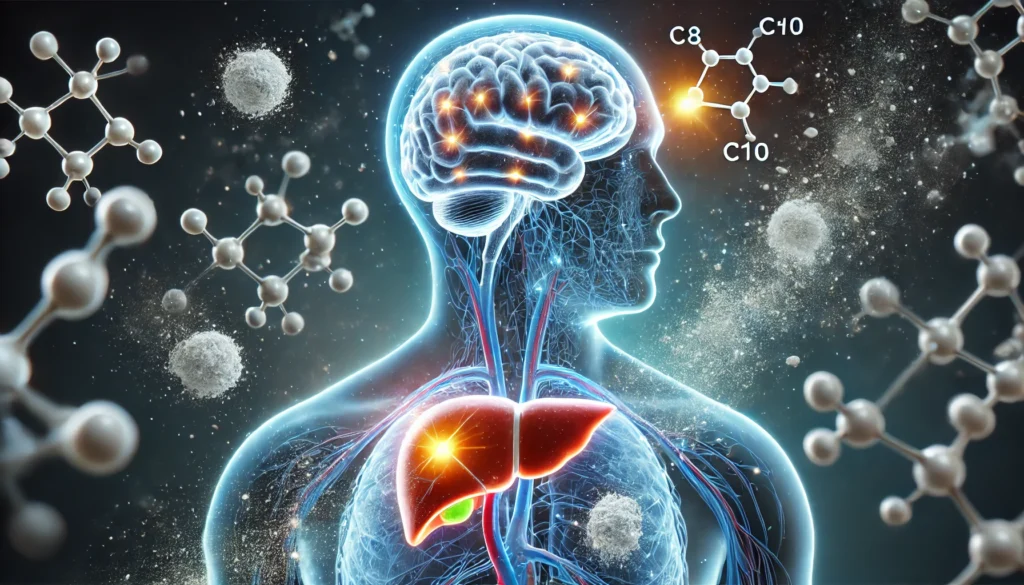Introduction
In the ever-evolving landscape of nutritional science, medium-chain triglycerides (MCTs) have garnered significant attention for their unique metabolic properties and potential health benefits. Traditionally consumed as a liquid oil, MCTs are now available in powdered form—an innovation that’s increasingly popular among athletes, ketogenic diet followers, biohackers, and wellness enthusiasts. But with the rise of both MCT powder and MCT oil powder, confusion is inevitable. Are these products truly interchangeable? What differentiates them in terms of formulation, absorption, and efficacy? And how do they fit into a scientifically sound strategy for energy, cognition, and metabolic health?
You may also like: MCT Oil for Dementia and Brain Health: Exploring Its Role in Memory, Function, and Alzheimer’s Support
These are not trivial questions. As the functional foods and nutraceuticals industry continues to innovate, MCT-based supplements are marketed with promises ranging from weight loss and cognitive enhancement to improved digestive tolerance. Yet, without a grounded understanding of their biochemical behavior and clinical relevance, consumers and even healthcare practitioners may be misled by marketing hype rather than evidence-based applications. This article offers a comprehensive, science-backed exploration of MCT powders, with a focus on how they compare to liquid versions and how both MCT powder and MCT oil powder can be used effectively and safely.
By unpacking the nutritional differences, mechanisms of action, bioavailability, and common uses for these formulations, we aim to clarify the true potential of powdered MCTs in various health scenarios. Whether you’re evaluating MCT supplements for mental clarity, athletic performance, gut health, or fat metabolism, the following sections will guide you through the critical details, supported by clinical evidence and expert commentary. Let’s begin by understanding what exactly MCT powders are and how they are created.

What Is MCT Powder? Understanding the Basics
MCT powder is a dry, powdered form of medium-chain triglycerides, typically derived from coconut or palm kernel oil. Unlike the liquid form, which consists of pure or fractionated oil, MCT powder is created through a process called spray-drying. This method combines MCT oil with a carrier substance, such as acacia fiber, tapioca starch, or gum arabic, which stabilizes the oil and transforms it into a shelf-stable, easily transportable powder.
This transformation has practical benefits. Powders are less greasy, easier to mix into beverages, and more convenient for travel or pre-measured supplementation. Moreover, many users report that MCT powder is easier on the stomach than pure liquid MCT oil, making it an attractive option for those who experience digestive upset from traditional MCT supplements.
It’s important to note, however, that the efficacy of MCT oil powder is not solely determined by the MCTs themselves. The choice of carrier agents, the concentration of active MCTs, and the presence of additional compounds such as prebiotics or emulsifiers can significantly affect absorption, metabolism, and overall impact on health outcomes. Not all MCT powders are created equal, and understanding these variables is essential for making an informed choice.
MCT Oil Powder vs MCT Powder: Is There a Difference?
While the terms MCT powder and MCT oil powder are often used interchangeably, there are subtle yet meaningful distinctions in how the terms are applied. MCT oil powder typically emphasizes the origin of the product—namely, that it begins as liquid MCT oil before being converted into powder form. On the other hand, MCT powder may imply a broader category that includes blends, functional additives, or even non-oil-based MCT sources.
From a scientific perspective, both terms refer to a formulation where MCTs are delivered in powdered format. The key difference lies in the carrier matrix and additional ingredients used. For example, one brand of MCT oil powder might use acacia fiber, providing a prebiotic boost, while another MCT powder might incorporate collagen peptides or caffeine for specific performance-enhancing effects. This means that consumers must look beyond the label and carefully evaluate product composition, especially if the powder is being used in therapeutic or high-performance contexts.
Bioavailability studies suggest that well-formulated MCT oil powder can deliver similar levels of ketone production and metabolic stimulation as liquid MCTs. However, this assumes a high-quality formulation with minimal fillers, low glycemic load, and adequate concentration of caprylic (C8) and capric (C10) acids—the most ketogenic MCT types. Inferior powders with excessive carrier content may dilute the active dose, reducing clinical efficacy.

The Science Behind MCTs: Why Powdered Form Matters
Medium-chain triglycerides possess a unique metabolic profile. Unlike long-chain fatty acids, which are absorbed via the lymphatic system and require bile salts for digestion, MCTs are rapidly transported to the liver via the portal vein. There, they are promptly converted into ketones, which can be used by the brain and body as an alternative fuel source. This rapid conversion gives MCTs a thermogenic and performance-enhancing edge, particularly in ketogenic diets or fasting states.
When MCTs are consumed in powder form, this biochemical process is largely preserved. However, the presence of carriers, additives, and emulsifiers can either enhance or impair the rate and efficiency of MCT absorption. A well-formulated MCT powder maintains the integrity of caprylic and capric acid chains, promotes rapid dissolution in liquids, and minimizes glycemic interference.
In addition to being a functional fat source, MCT oil powder may serve as a delivery vehicle for synergistic nutrients. Emerging formulations combine powdered MCTs with nootropics, adaptogens, or electrolytes, targeting cognitive resilience, adrenal support, and hydration. The powdered format also allows for greater precision in dosing, which is especially important in clinical contexts where titration of MCT intake is required for neurological or metabolic therapies.

MCT Powder and Digestive Tolerance: A Key Benefit
One of the most commonly cited drawbacks of liquid MCT oil is gastrointestinal discomfort, especially when consumed in larger doses or on an empty stomach. Symptoms can include bloating, cramping, diarrhea, and nausea. These side effects are often attributed to the oil’s rapid transit through the gastrointestinal tract and its impact on bile secretion and gut motility.
In contrast, MCT powder is generally regarded as gentler on the digestive system. The use of fiber-based carriers, such as acacia or inulin, helps to moderate the release of fatty acids and buffer their interaction with the gut lining. This improved tolerance makes MCT oil powder particularly valuable for populations with sensitive digestion, such as individuals recovering from illness, those with irritable bowel syndrome (IBS), or patients on enteral nutrition.
Moreover, the combination of MCTs with fermentable fibers may offer additional prebiotic benefits, promoting the growth of beneficial bacteria such as Bifidobacteria and Lactobacilli. These effects, while not the primary mechanism of MCTs, add another layer of utility to MCT powder supplements, especially when used in long-term wellness plans that aim to balance gut microbiota while enhancing energy metabolism.
How MCT Oil Powder Supports Ketosis and Weight Management
The ketogenic diet is built on the premise of inducing nutritional ketosis—a state where the body produces and utilizes ketones as its primary energy source. MCTs, particularly caprylic acid (C8), are known to elevate ketone levels more rapidly and predictably than dietary fats or coconut oil. This makes them a powerful tool for individuals seeking to deepen or maintain ketosis, especially during transitional phases or metabolic plateaus.
MCT powder plays a valuable role in this process by providing a concentrated, easy-to-consume source of ketogenic fats without the greasy texture or digestive burden of liquid oils. Studies have shown that MCT oil powder can increase energy expenditure, reduce appetite, and enhance fat oxidation—three critical pillars in sustainable weight management. Unlike glucose, ketones have a satiating effect on the brain, reducing hunger hormones like ghrelin and enhancing leptin sensitivity.
In addition, the portability and mixability of powdered MCTs make them ideal for use in meal replacements, fasting beverages, or pre-workout formulas. Their ability to stabilize energy, sharpen mental focus, and curb cravings makes MCT powder a preferred supplement among those seeking metabolic efficiency without the rollercoaster of blood sugar highs and lows.
Cognitive and Neurological Benefits of MCT Oil Powder
Beyond metabolism and weight management, MCTs—especially in powdered format—are gaining traction for their neuroprotective properties. The brain, although only 2% of the body’s mass, consumes nearly 20% of its energy. Under normal circumstances, glucose is the brain’s primary fuel. However, in times of glucose restriction—such as fasting or carbohydrate limitation—the brain can efficiently utilize ketone bodies as an alternative energy source.
This ketone-driven metabolism has implications for neurodegenerative diseases, cognitive performance, and mental clarity. Preliminary research suggests that MCT oil powder may enhance cognitive function in older adults and individuals with mild cognitive impairment (MCI). There is also interest in its role in managing epilepsy, Alzheimer’s disease, and Parkinson’s disease, where glucose hypometabolism plays a central pathophysiological role.
Additionally, MCT powder is often included in nootropic stacks and brain-boosting beverages aimed at increasing focus, memory, and reaction time. While more human studies are needed to confirm long-term cognitive outcomes, the immediate effects of increased ketones on alertness and clarity are well-documented. These properties make MCT powders an appealing option for students, professionals, and anyone seeking a mental edge without caffeine dependence.
Comparing MCT Powder to Liquid MCT Oil: Pros and Cons
When choosing between MCT powder and its liquid counterpart, several practical and physiological factors must be considered. The liquid form is more concentrated and typically more cost-effective per gram of MCT. It also has a faster onset of ketone production, making it ideal for rapid pre-workout fueling or therapeutic ketosis induction.
However, MCT oil powder offers unmatched convenience, better gastrointestinal tolerance, and greater formulation flexibility. It can be added to protein shakes, coffee, or even baked goods without the mess or separation issues common to oil. Additionally, the powder form is more stable and has a longer shelf life, particularly when stored in ambient conditions.
The choice ultimately depends on personal goals, digestive health, and lifestyle habits. For those on the go, with sensitive stomachs, or interested in integrating MCTs into more complex nutritional stacks, MCT powder may be the superior option. For high-dose therapeutic applications, liquid MCT oil still holds a prominent place due to its purity and dosing precision.
Formulation Considerations: What to Look for in an MCT Powder
Not all MCT powders are created equally. When evaluating a product, it’s important to assess several formulation factors. First, the ratio of MCTs to carrier agents determines the actual potency of the product. A high-quality MCT oil powder should contain at least 70% MCTs by weight, with minimal use of high-glycemic fillers like maltodextrin.
Second, the type of MCTs matters. Caprylic acid (C8) and capric acid (C10) are the most effective for ketone production, while lauric acid (C12), although present in coconut oil, behaves more like a long-chain fat and has limited ketogenic value. A good MCT powder will clearly specify the breakdown of these fatty acids.
Third, the choice of carrier can influence health outcomes. Acacia fiber, for example, is a prebiotic with excellent digestive tolerance, while tapioca starch may raise blood sugar in sensitive individuals. Clean labels, third-party testing, and transparency in ingredient sourcing are essential markers of quality in the supplement industry.

MCT Powder in Clinical Nutrition and Specialized Diets
Beyond consumer wellness, MCT oil powder is increasingly used in clinical nutrition, particularly for patients with fat malabsorption, pancreatic insufficiency, or specific neurological conditions. Its rapid absorption and minimal reliance on digestive enzymes make it suitable for enteral feeding formulations, especially in patients with compromised gastrointestinal function.
Ketogenic therapies for epilepsy, autism, and glioblastoma often include MCTs as a cornerstone fat source, and MCT powder provides a convenient vehicle for delivering these fats in pediatric or elderly populations who may not tolerate oils well. It’s also used in metabolic wards and oncology settings, where precise macronutrient manipulation is required.
For practitioners, understanding the pharmacokinetics and dietary implications of MCT powders is vital for crafting safe, personalized interventions. The ability to adjust fat ratios, support mitochondrial function, and modulate inflammation through MCT powder supplementation offers a promising avenue for diet-based therapies rooted in metabolic science.
Frequently Asked Questions
1. What is the difference between MCT powder and MCT oil powder?
Both terms refer to powdered forms of medium-chain triglycerides, but “MCT oil powder” emphasizes that the product originates from liquid MCT oil, typically processed through spray-drying with a carrier. “MCT powder” may be a broader term that includes blends or formulations with added ingredients like collagen or caffeine. The real distinction lies in formulation specifics—active MCT content, carrier type, and additional compounds used.
2. Is MCT powder as effective as liquid MCT oil?
Yes, a well-formulated MCT powder can be as effective as liquid oil in raising ketone levels and supporting energy metabolism. However, the concentration of active MCTs, especially caprylic acid (C8), and the choice of carrier will impact its overall efficacy. Always look for products with high MCT percentages and minimal fillers.
3. Can MCT oil powder help with weight loss?
MCT oil powder supports weight loss by increasing satiety, enhancing fat oxidation, and reducing appetite. Its role in promoting ketosis also helps stabilize energy levels and reduce sugar cravings. While not a magic solution, it can be a useful tool when combined with a calorie-controlled, nutrient-dense diet.
4. Does MCT powder affect blood sugar levels?
Generally, MCT powder has a minimal impact on blood sugar, especially if it contains low-glycemic carriers like acacia fiber. However, formulations that use maltodextrin or high-starch fillers may increase glucose levels. It’s important to read labels and select products designed for glycemic stability, especially for individuals with insulin resistance or diabetes.
5. Is MCT powder better for digestion than liquid oil?
Many users report that MCT powder is easier on the stomach than liquid oil, particularly when consumed in larger doses. The powder form slows the release of fatty acids and minimizes gastrointestinal distress, making it more tolerable for sensitive individuals or those with digestive disorders.
6. How should MCT oil powder be used in daily nutrition?
MCT oil powder can be added to coffee, smoothies, shakes, or used in baking to boost fat intake without altering flavor significantly. It’s ideal for pre-workout fueling, meal replacement strategies, or as part of a ketogenic diet. Dosage should be gradually increased to assess tolerance and avoid digestive upset.
7. Are there any side effects of using MCT powder regularly?
Mild digestive symptoms may occur when first introducing MCT powder, such as bloating or loose stools. These typically resolve with dose adjustment. Long-term use is generally safe, but excessive intake without dietary balance can contribute to caloric excess and fat-soluble nutrient competition.
8. Can MCT powder support cognitive health?
Yes, MCTs provide a rapid source of ketones, which the brain can use for fuel. This can enhance mental clarity, focus, and cognitive resilience, particularly during fasting or low-carb phases. MCT oil powder is often used in nootropic stacks or by those managing cognitive decline, although more research is needed in clinical populations.
9. How does MCT powder fit into a ketogenic or low-carb diet?
MCT powder enhances the ketogenic diet by increasing ketone production, improving fat-based energy metabolism, and reducing hunger. It also helps buffer carbohydrate intake and stabilize mood, making adherence to the diet more sustainable. It’s one of the most effective fats for entering and maintaining nutritional ketosis.
10. What should I look for when buying MCT oil powder?
Choose MCT oil powder with high percentages of caprylic and capric acids, clean carriers like acacia fiber, and no artificial sweeteners or fillers. Third-party testing, transparent labeling, and sourcing from reputable brands are key indicators of quality. Avoid products with unnecessary additives or low MCT content.

Conclusion
The emergence of MCT powder and MCT oil powder represents a significant advancement in functional nutrition, offering a versatile, effective, and user-friendly format for delivering the powerful benefits of medium-chain triglycerides. Whether your goals center around weight management, cognitive function, metabolic health, or therapeutic support, powdered MCTs provide a practical solution backed by a growing body of scientific evidence.
As with any supplement, the key lies in quality, formulation, and individualized application. Not all powders are equal, and understanding the science behind absorption, carrier agents, and fatty acid composition is essential for maximizing results. MCT oil powder brings added convenience and digestive comfort, while still delivering potent metabolic support. Its inclusion in clinical nutrition, athletic performance, and everyday wellness routines is a testament to its efficacy and adaptability.
By integrating high-quality MCT powder into your dietary strategy, you can leverage one of the most efficient and research-supported fats available today. Whether used as fuel for your brain, support for your gut, or a catalyst for fat-burning energy, MCTs in powdered form are more than just a trend—they’re a powerful, science-based tool for optimized living.
Was this article helpful? Don’t let it stop with you. Share it right now with someone who needs to see it—whether it’s a friend, a colleague, or your whole network. And if staying ahead on this topic matters to you, subscribe to this publication for the most up-to-date information. You’ll get the latest insights delivered straight to you—no searching, no missing out.
Further Reading:
MCT Polyphenols and Brain Health: Exploring the Synergy Between Polyphenols and MCT Oil
MCT Oil vs Fish Oil: Scientific Comparison for Brain, Heart, and Metabolism



